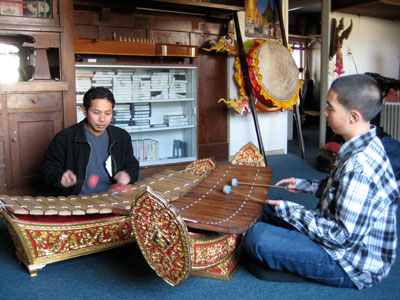
Somprasong Loakimpongswat
Thai ranad-ek
 The ranad-ek is a Thai xylophone. It has 21 or 22 wooden bars suspended by cords over a boat-shaped trough resonator, and is played with two mallets. It is used as a leading instrument in the piphat (a genre of Thai classical music) ensemble. The ranad-ek is responsible for opening each piece, with the rest of the orchestra following its introduction. It is the prominent, defining instrument in Thai classical music. The quality of an ensemble is often judged by by the skill of its ranad-ek player. It is accompanied by the ranad-tum, the secondary xlyphone. Unlke the ranad-tum, the ranad-ek is more challenging of the two as it requires the musician to play the same notes on two octave scales simultaneously, moving both hands at the same pace and at the same interval precisely while hitting smaller keys. The ranad-ek can be played with two types of mai (playing sticks). The more common mai with cushioned heads provides a softer, smoother sound, while the solid-headed mai are used by more advanced players for a sharper, brighter, more pronounced sound so that the ranad-ek is heard over the other instruments during Thai classical dance dramas.
The ranad-ek is a Thai xylophone. It has 21 or 22 wooden bars suspended by cords over a boat-shaped trough resonator, and is played with two mallets. It is used as a leading instrument in the piphat (a genre of Thai classical music) ensemble. The ranad-ek is responsible for opening each piece, with the rest of the orchestra following its introduction. It is the prominent, defining instrument in Thai classical music. The quality of an ensemble is often judged by by the skill of its ranad-ek player. It is accompanied by the ranad-tum, the secondary xlyphone. Unlke the ranad-tum, the ranad-ek is more challenging of the two as it requires the musician to play the same notes on two octave scales simultaneously, moving both hands at the same pace and at the same interval precisely while hitting smaller keys. The ranad-ek can be played with two types of mai (playing sticks). The more common mai with cushioned heads provides a softer, smoother sound, while the solid-headed mai are used by more advanced players for a sharper, brighter, more pronounced sound so that the ranad-ek is heard over the other instruments during Thai classical dance dramas.
Raised in Samut Songkhram, Thailand, Somprasong Loakimpongswat’s family managed its own Thai classical music ensemble, and he studied the kong wong (circular gamelan) from his father from age seven, eventualy receiving a degree in Music Educatiuon fron Rajaphat Institute at Ban Somdej Chao Phraya. He has been teaching in California since 1998, and since 2000 has been a resident music instructor at the Thai Cultural Center, co-located within the Wat Mongkolratanaram Temple in Berkeley, teaching 15 different Thai classical and folk instruments. Of the ranad-ek, Loakimpongswat says, “Thai music directly communicates what it means to be Thai. It is the symbol of the culture. Every ceremony, whether it is religious, artistic or royal, must be accompanied or opened with music. In addition, each ceremony – funerals, religious holidays, monk ordinations, royal events, or candle-lightings – has its own collection of songs appropriate for the occasion.”
In 2009, Loakimpongswat participated in ACTA’s Apprenticehip Program with apprentice Franco Nguon. The apprenticeship focused on passing on material from the ranad-ek repertoire, which up until this point Loakimpongswat has been the sole performer of within the local community; learning a solo piece; and developing practice with the solid hardwood black mai, typically reserved for advanced players.
